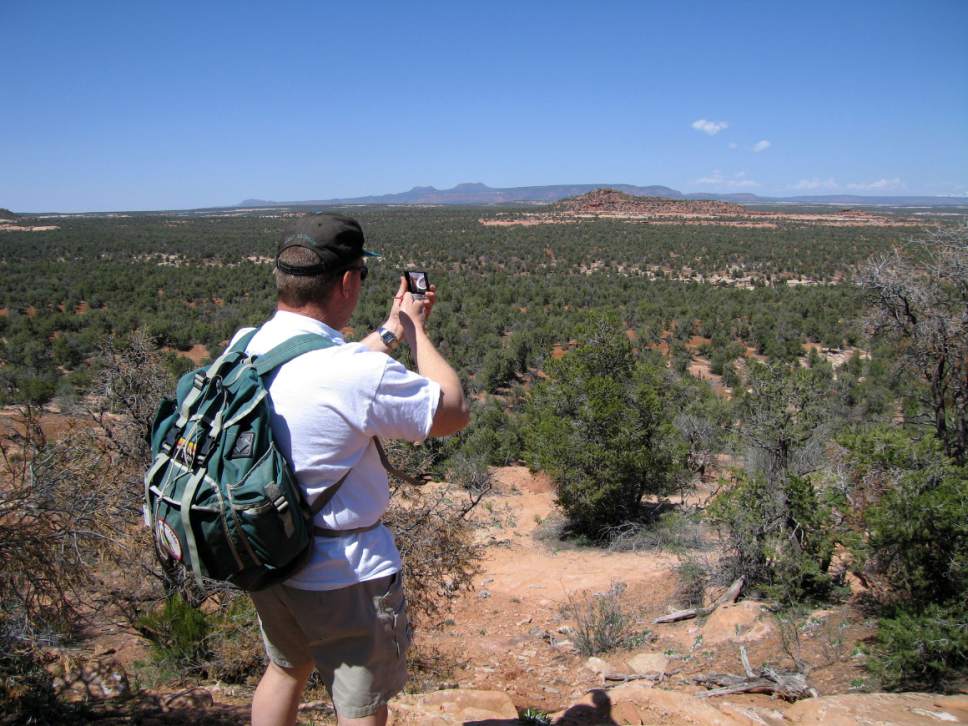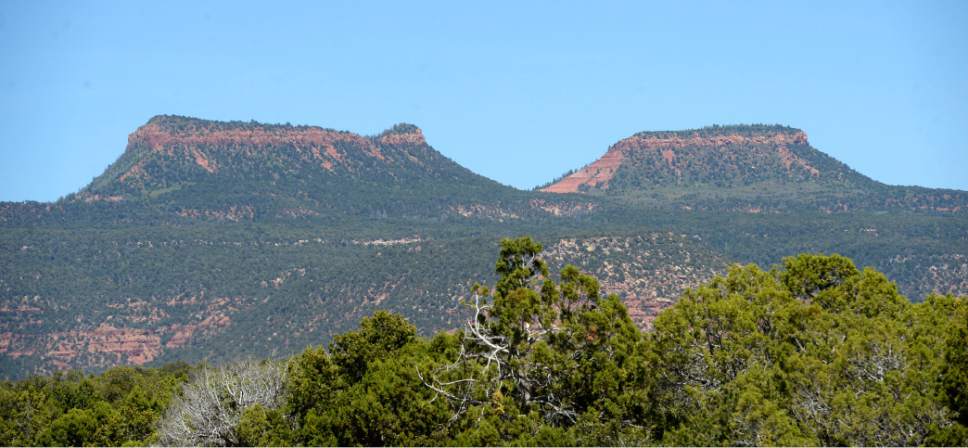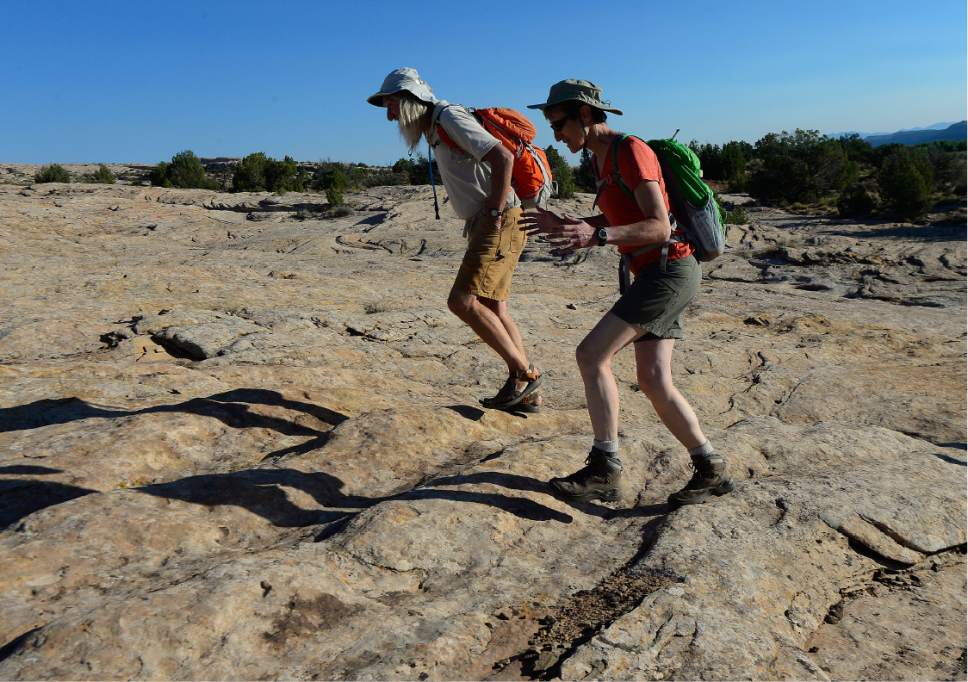This is an archived article that was published on sltrib.com in 2017, and information in the article may be outdated. It is provided only for personal research purposes and may not be reprinted.
Washington • Interior Department Secretary Ryan Zinke says he will recommend possible action to change the Bears Ears National Monument within 45 days of the executive order President Donald Trump is scheduled to sign on Wednesday, ordering a review of all monument designations over two decades, back to the creation of the Grand Staircase-Escalante monument.
Zinke said the executive order will ask for a final report on the monument designations from 1996 forward within four months, but an initial review will focus on President Barack Obama's naming of Bears Ears in late December.
"I think the concern that I have and the president has is that when you designate a monument, the local community should have a voice," Zinke told reporters at the White House.
The interior secretary said that the order will look at about 30 monuments — including those protecting marine areas — and examine possible tweaks to the 1906 Antiquities Act that gives a president unilateral power to set aside public lands as monuments. He said he wasn't sure if at the end of the process he would recommend changes to the law.
"I'm not going to presuppose what the outcome is going to be," Zinke said, adding that he would plan to talk to members of Congress, governors and other stakeholders as part of the review. He also said he would travel to Utah during the next 45 days.
Trump is slated to go to the Interior Department on Wednesday to sign the order, which includes a review of all monuments more than 100,000 acres in size named since Jan. 1, 1996. The review time was chosen to ensure Grand Staircase-Escalante National Monument, which was named in
September 1996, was included.
Zinke stressed that Trump's order would not strip any monument of a designation or loosen any environmental regulation on current monuments. He said the review was prompted by concerns from members of Congress and states about monument declarations that went against the wishes of local communities and affected public access and the livelihoods of loggers, anglers and ranchers.
"We feel that the public, the people who the monuments affect should be considered," Zinke said, noting that it was "yet another example of the president doing exactly what he is saying" and would restore trust between local communities and Washington.
Utah leaders have been pressing the White House to rescind the Bears Ears designation as well as trim the 1.8 million acre Grand Staircase-Escalante National Monument.
A new poll out Tuesday showed a majority of Utahns, 52 percent, support reducing the 1.35 million acres of the Bears Ears monument or jettisoning the designation altogether. Some 41 percent said Trump should not take any action on the monument, according to the poll conducted by Dan Jones & Associates and commissioned by UtahPolicy.com.
On Grand Staircase-Escalante, 53 percent of Utahns said Trump should leave that monument alone while 41 percent want it reduced or the designation rescinded.
Sally Jewell, who headed Interior when Bears Ears was named, defended the designation as having gone through a serious review.
"We worked very closely with our scientists, people on the ground, people in the communities that know these landscapes well, the tribes, particularly in case of Bears Ears, that understood what's needed for hunting, gathering and traditional practices and sacred sites. Those shaped the boundaries of these monuments which were very carefully thought out," Jewell said in an interview Tuesday with The Salt Lake Tribune, noting that she had visited Bears Ears on her recent trip back to Seattle after leaving the Obama administration.
Jewell said Interior did everything it could to craft a monument proclamation that protected Bears Ears' cultural resources and natural treasures, while respecting the wishes of San Juan County officials.
San Juan County elected leaders opposed the monument's designation.
"When you get out and look at the resource and listen to the people, including the opponents, a couple things become clear, particularly among tribal members that were against it. They had a lot of misinformation about what they would be allowed to do. That helped us to make sure that was clarified in the proclamation. I am very confident our work will stand the test of time," Jewell said.
Jewell said there's no question the monuments set aside during her time were "legitimate and appropriate in the spirit of the Antiquities Act."
As for Bears Ears, Jewell, who spent four days in the area last July, said she listened to local leaders, but Obama felt compelled to act after legislative efforts to protect the region failed. The administration deliberately waited until the last minute to give Rep. Rob Bishop's Public Lands Initiative (PLI) every chance to succeed.
Bishop belatedly introduced a one-sided lands bill he must have known was doomed to failure since he nixed painstakingly negotiated compromise language, Jewell said. Yet Obama met Utah leaders halfway by delineating a monument that hewed closely to conservation areas proposed in the PLI to create a monument 550,000 acres smaller than the tribes sought.
"Every member of [Utah's] delegation and governor's office knew for years we would use the Antiquities Act by the end of the Obama administration if they were not successful getting legislation passed.
"None of this was a surprise," Jewell said.
Shaun Chapoose, chairman of the Ute Indian Tribe Business Committee, characterized any move to revoke the monument as an attack on Indian country.
Bears Ears "was the first opportunity that American citizens had for Native American tribes, not one tribe, but five with support from other federally recognized tribes, asking to preserve and protect this land," Chapoose told reporters in a conference call. "This is troubling for all Americans. Once you destroy these types of resources, these habitats, these places that are untouched, you can never go back."
Trump's planned executive order alarmed the environmental community.
"This executive order by President Trump is the opening salvo in an unprecedented attack on America's federal public lands, and Utah's Bears Ears and Grand Staircase-Escalante National Monuments are directly and deliberately in the crosshairs," said Scott Groene, Executive Director of the Southern Utah Wilderness Alliance. "At Bears Ears, the president has asked Secretary Zinke to manufacture the political cover for his administration to break the government's promise to Native American Tribes to protect and preserve their ancestral homeland. At Grand Staircase, the president is seeking to reward his Big Coal backers at the expense of one of the nation's wildest and most dramatic redrock landscapes."
Marc Short, the White House director of legislative affairs, said earlier Tuesday that the review will look at the possible overreach of monument designations, including the impact they have on Americans who graze livestock on federal acreage. He was not sure if the review would seek to change the Antiquities Act, which has been used by every president since Teddy Roosevelt to declare monuments.
"I think that we allow the review process to play out," Short told a group of reporters.
Short said the concern about the monument designations comes down to people who use the area for grazing who feel their rights were infringed on. "In many cases there's been an outcry saying that there's a federal government overreach that was taking away land that they were either using for agriculture purposes or purposes for their cattle, their sheep," Short said.
The Public Lands Council, representing ranchers, said that allotments for livestock have decreased significantly at the Grand Staircase-Escalante National Monument since it was declared, down to 75,000 now from 106,000 in 1996.
"The executive order is an important first step to reining in past designations that were pushed through without local input," said Dave Eliason, a Utah rancher who is president of the council.
"Elevating millions of acres to monument status without local input or economic analysis results in unrecoverable losses to the local communities. We applaud the administration's decision to step back and re-evaluate the necessity and scope of previous designations."
John Wallin, acting executive director of the Colorado-based Conservation Lands Foundation, says it is bunk to claim that monument designations have hurt grazing and says all the designations have already been studied before they were made.
"The public review happened over many years already, and that's why we have popular monuments and why the Antiquities Act is America's most important conservation law," Wallin said. "This is a distraction from the Utah congressional delegation's insincere and failed attempts to legislate. It should be seen for what it is: a direct attack on tribes and communities of color whose stories have only come to light because of the Antiquities Act."









